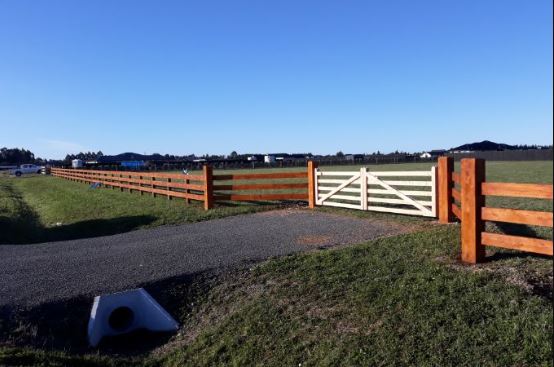We all know that horses can be highly active and unpredictable at times. So when you’re considering equine fence installation, safety should be the number one priority. An equine fence needs to be strong and highly visible, so the horse sees it as a solid barrier.
Before you even begin the task of fencing, you need to assess the suitability of the land. Horses need plenty of space to move around—about half a hectare per horse. It should be good grazing land, as horses are big eaters. Avoid frost prone areas as they quickly turn to mud when trampled by hooves.
There are three main farm fence installation options available—post and rail fencing, electric fencing or a combination of the two styles.
Post and Rail Fencing
The wooden post and rail fence is very traditional, works well and looks great. They’re a perfect option for the road facing frontage of your property. The rails need to be wide to ensure it presents a solid barrier to your animals. It’s also important to fix the rails to the inside of the fenced area, so your horse doesn’t pop the rail off when they lean on them! Wooden rail fences do require a bit of ongoing maintenance as the animals tend to chew on the wood and rub against the fence. For large areas, the material costs can increase to the point that other fencing styles may work out to be more cost-effective.
Electric Fencing
At SBRC, we use and recommend Gallagher Equifence electric fencing. It is very long lasting (25 years), cost-effective (tightly tensioned wire allows for longer spans between posts) and most importantly – very safe for horses. The large diameter polymer-coated steel wire is smooth and highly visible, so it will not cause injury to your horse.
Use can also use temporary electric fencing within your paddock to keep the peace between animals and to control grazing.
Electrified Wooden Fence
If you already have existing post and rail fencing or prefer wooden fences but want to minimise maintenance issues—the best option is to add electric wire using distance insulators. These provide an electric barrier that stands off from the existing fence, so animals cannot damage the fence or get entangled in it.
Fences styles to avoid
We don’t recommend plain high tensile steel wire or barbed wire fencing, as both can cause serious injury to your livestock. Wire mesh is also best avoided as its easy for hooves to get entangled.
Mud and manure are the biggest issues facing horse owners, and we recommend creating a mud-proof pen where you can keep the horses temporarily while the mud dries out. Mud is a major cause of infection.
Whatever style of horse fencing you decide on, get the job done right. Good alignment is crucial to post and rail fencing, or it just looks wrong! Gallagher electric fencing is a high tension product that is best installed by professionals. If you’re looking for farm and lifestyle fence installation here in North Canterbury—give Steve a call at SBRC. We provide a complete equine fencing service, including construction of arenas and round horse yards.






